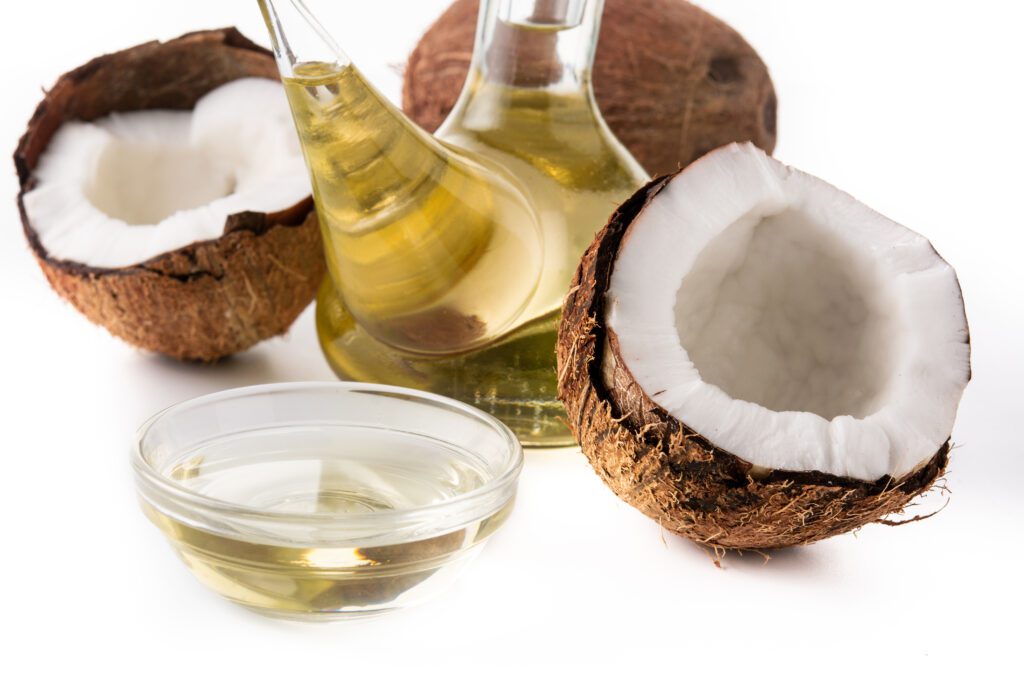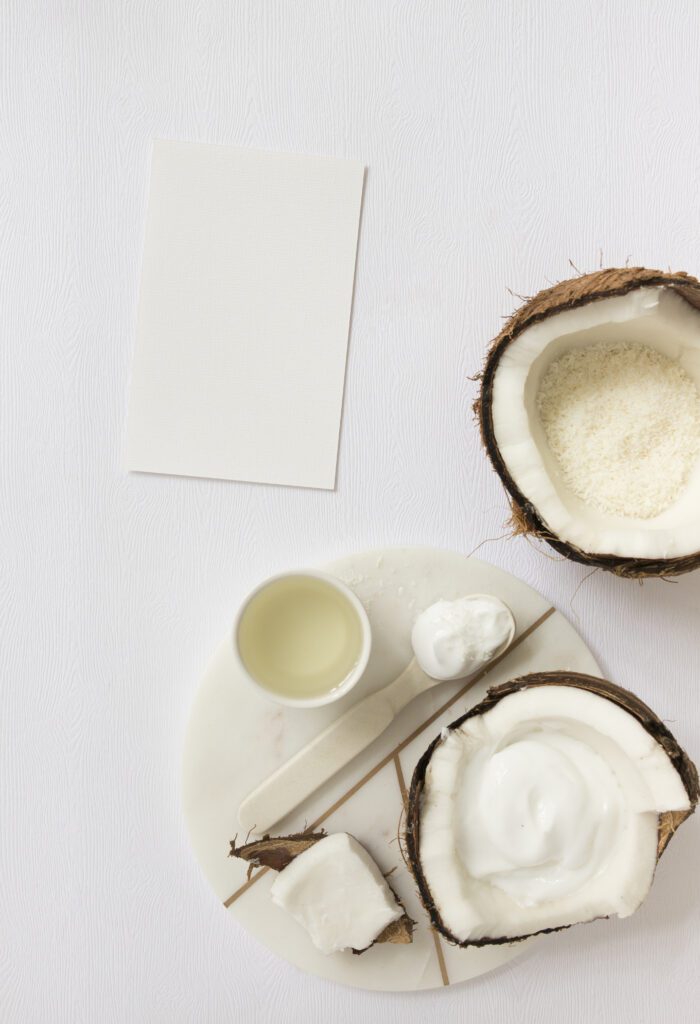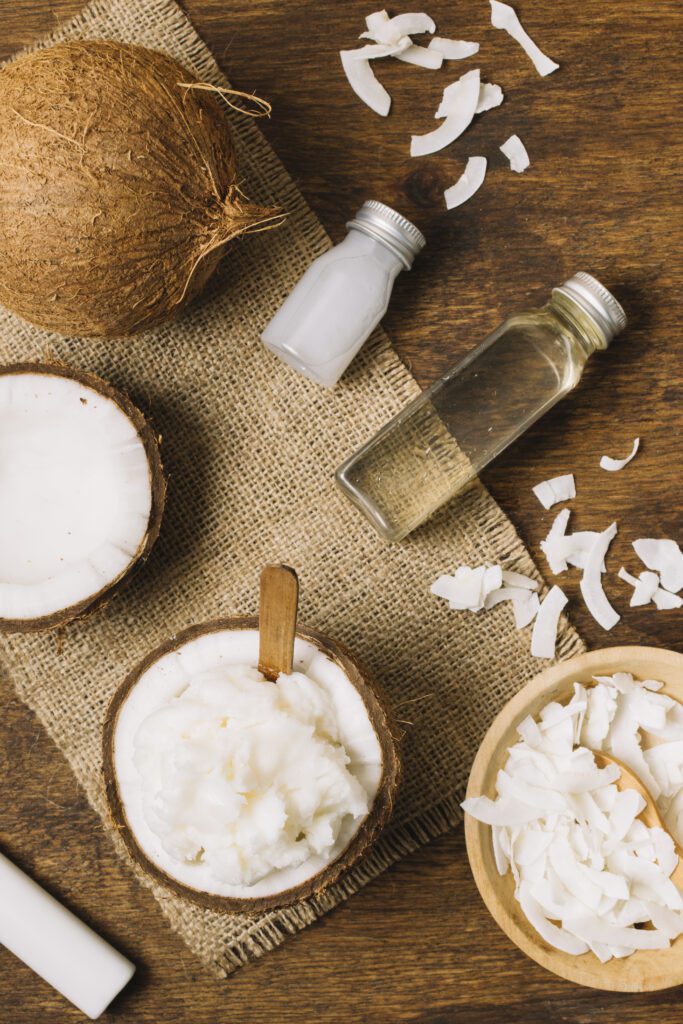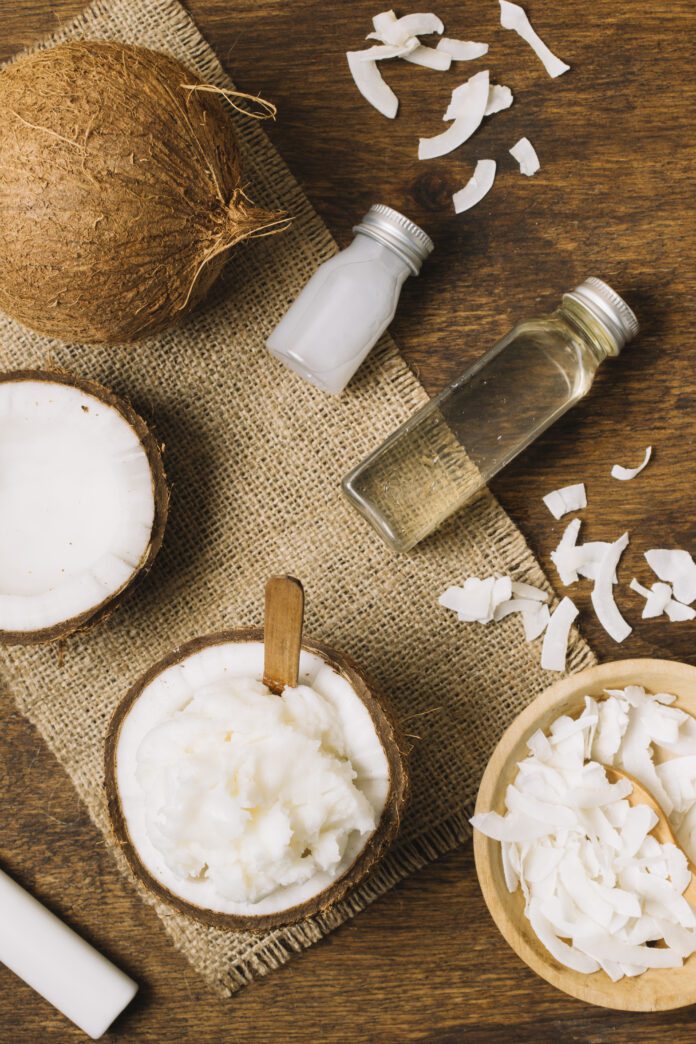Mask for Face with Coconut Oil has many beneficial uses beyond cooking; not only can it be used as an ingredient in cosmetic products such as body washes and lotions, but it can also be incorporated into facial masks for skincare and anti-aging benefits. Particularly noteworthy are coconut oil’s anti-inflammatory, moisturizing, and antibacterial qualities, which make it a fantastic ingredient in facial masks aimed at improving the health of skin issues like acne or aging through specific solutions like coconut oil masks.
We will explore the benefits and effects of coconut oil face masks as well as some DIY recipes that work, answering frequently asked questions regarding natural skin treatments such as coconut oil.

Coconut Oil Face Mask Benefits and Considerations for Use
1. Deep Miniaturization
Coconut oil is an amazingly moisturizing product. The lauric acid contained within its fatty acids works to lock moisture inside of pores, keeping moisture locked inside while preventing loss through perspiration. Therefore, coconut oil can be an ideal solution for those suffering from dry skin conditions or living in climates where humidity levels drop rapidly. A coconut oil face mask can restore your moisture levels quickly, leaving skin soft, smooth, supple, and well-hydrated!
Coconut Oil’s Anti-Aging Properties
Coconut oil contains antioxidants, which are invaluable in combatting free radicals that contribute to aging, while laurel acid found in coconut oil boosts collagen production for better skin elasticity and keeps wrinkles at bay. Regular application of a coconut oil-based mask will minimize appearances of wrinkles while leaving skin healthy and vibrant looking.
3. Combat Acne and Pimples
Coconut oil contains natural antibacterial and antifungal properties that make it an excellent way to treat acne. By cleansing away harmful bacteria that clog up pores and cause breakouts, as well as its anti-inflammatory effects that reduce swelling and redness associated with pimples, coconut oil is an ideal remedy. But beware: coconut oil might not suit everyone with oily skin, as this could potentially clog your pores further.
4. Soothe Skin Irritation
Coconut oil could be the ideal remedy for treating skin issues like eczema, psoriasis, and general irritation. With its anti-inflammatory properties and ability to soothe redness and irritation on sensitive areas, applying a coconut oil face mask could bring relief and aid in healing.
5. Brightens and Evens Out Skin Tone
Coconut oil is an abundant source of vitamin E, which has many skin health benefits, including improving and evening out skin complexion and diminishing dark spots, hyperpigmentation, and acne scarring over time. Regular application of an oil-based face mask made with coconut can bring a healthier-looking, brighter, and more even complexion.
6. Hydrates the Skin
Coconut oil’s emollient properties form a protective barrier over the skin that keeps moisture locked inside, making it especially helpful in colder climates and for those with dry skin. By including coconut oil in your skincare routine, you will enjoy silky and hydrated skin all year long!
DIY Coconut Oil Face Mask Recipes.
Doing your own coconut oil face mask at home is both straightforward and budget-friendly. Here are a few recipes you should give a try based on the type of skin you have and your specific needs.
1. Coconut Oil and Honey Hydrating Mask
Honey is known to possess moisturizing and antibacterial properties, making it the ideal partner to coconut oil in providing skin nourishment and softening benefits. Together they’ll make for smooth skin!
Ingredients: 1 tablespoon of organic coconut oil
1 tablespoon of raw honey
Instructions: It is advised to warm the coconut oil so as to liquefy it.
Combine honey and coconut oil in a small bowl until they are fully blended.
Apply the mixture to your skin and wait 10-15 minutes before washing off the mask.
Start by cleansing with warm water, then patting dry before applying your usual moisturizer.
Benefits of Honey Mask: Honey is known for its antibacterial properties, which help cleanse skin without creating irritation. This mask provides much-needed hydration without irritation to sensitive or dry skin types.


2. Coconut Oil and Turmeric Brightening Mask
Turmeric is an effective antioxidant and anti-inflammatory, helping to brighten skin, lessen pigmentation, and even out skin tone. When combined with coconut oil, it creates an even stronger mask to give you a radiant complexion.
Ingredients: For turmeric tonic tea are one tablespoon of coconut oil and one tablespoon of powdered turmeric.
Instructions: For best results, combine turmeric and coconut oil using a spoon until they form a uniform paste.
Apply a mask: Evenly to your face, and allow it to remain for approximately 10 minutes before washing it off.
Cleanse the mask using some water; just be aware that turmeric may leave a stain behind on towels or clothing!
Benefits: This treatment is ideal for those struggling with uneven, dull skin, dark spots, and hyperpigmentation. It helps improve skin quality while providing your body with antioxidant support to combat inflammation and decrease swelling.
3. Coconut Oil and Aloe Vera Soothing Mask
Aloe Vera is well-known for its soothing and cooling properties, making it the perfect ingredient in combination with coconut oil to soothe skin irritation while encouraging healing. This mask can be applied directly onto affected areas to provide instantaneous relief and promote speedy healing.
Ingredients: This ingredient consists of] one tablespoon of coconut oil and one teaspoon of freshly gelled aloe Vera.
Instructions: Bounce together coconut oil and aloe Vera gel until well mixed in one small bowl.
Apply the paste to your face: Leaving it for 15 minutes to take effect.
Clean your skin thoroughly with water, and pat it dry afterwards.
Benefits: This mask can help soothe inflamed or irritated skin, making it an excellent solution for acne, sunburns, and other forms of skin inflammation.
4. Coconut Oil and Oatmeal Exfoliating Mask
Oatmeal, a plant-based exfoliate, works to remove dead skin cells while coconut oil keeps skin hydrated—creating the ideal combination for revitalizing and rejuvenating the skin while leaving it smooth and rejuvenated. This mask will leave skin feeling fresh and rejuvenated!
Ingredients for This Recipe: One tablespoon of coconut oil and two tablespoons of finely ground oatmeal
Instructions: Ideally, combine coconut oil and finely crushed oatmeal until a paste-like consistency is reached.
Gently massage the mixture onto your face using circular movements.
Rinse it away after 10 minutes using some warm, lukewarm water.
Benefits: The benefits of exfoliation treatments include eliminating dead skin cells for a smooth, radiant, and glowing complexion. They’re particularly beneficial to those suffering from uneven or dull complexion.


Common FAQs About Coconut Oil Facial Masks (COFMs)
1. Is Coconut Oil Beneficial for All Skin Types?
Coconut oil can be an ideal way to treat various skin conditions, although it might not suit everyone. Coconut oil works particularly well on sensitive, dry, and aging skin as it provides nourishment and hydration; however, those with acne-prone or oily skin might find that applying it could clog their pores, resulting in breakouts if applied unwisely—it would be wiser to conduct an experiment using a patch before applying coconut oil all over your face, especially if yours is fragile or predisposed to acne breakouts.
2. How Often Should I Apply a Coconut Oil Face Mask?
Applying a coconut oil facial mask two to three times every week should be sufficient for most. Overdoing it may result in irritation or clogged pores for those with acne-prone or oily skin; applying more often—perhaps three times weekly—may provide extra nourishment and moisture for mature or dry skin types.
3. Can Coconut Oil Be Left on My Skin Overnight?
Coconut oil should only be left on your skin for short durations, especially in cases of dry skin. When applied as a mask, try waiting at least 10 minutes before washing it off; if used at night as an overnight treatment, be mindful to use only minimal quantities to avoid greasiness and any possible blockages in pores.
4. Is It Safe to Apply Coconut Oil on Sensitive Skin?
Coconut oil can be an ideal way to soothe sensitive skin. With anti-inflammatory qualities that help soothe irritation and redness, coconut oil may also provide some comforting properties for soothing irritation and redness. However, if you are allergic to coconuts or have had previous issues related to their use, then using it on the face might not be recommended.
5. What Are My Alternatives to Coconut Oil for Face Masks?
If coconut oil doesn’t suit your skin type, there are other oils and substances you could try experimenting with instead. Some popular options are:
Oil of Argan: Perfect for anti-aging and hydration benefits. Jojoba oil can help balance the dry-oily skin balance. Honey has moisturizing and antibacterial properties. An avocado is full of healthy vitamins that may aid dry skin conditions.
Oil of tea tree: Perfect for acne-prone skin types.
6. Does Coconut Oil Help Treat Acne Scars?
Coconut oil is an excellent source of vitamin E and antioxidants, both of which help diminish acne marks and enhance skin texture. When applying it topically for active acne sufferers, however, be wary, as too much coconut oil could clog your pores, further worsening breakouts.


Conclusion
Coconut oil face masks are an easy, natural, and cost-effective way to boost skin health and maintain its glow. From signs of aging and dryness, acne breakouts, and dull complexions—to an irritated complexion or just general discomfort in your complexion—coconut oil’s unique properties provide soothing moisture for soothing, moistening, and rehydrating skin issues at an affordable cost—with DIY recipes provided by experts, experience all its advantages right in your own home!
Be mindful that while coconut oil can be great for your skin, it is still wise to conduct a patch test first and adjust according to what works for your individual skin needs.

